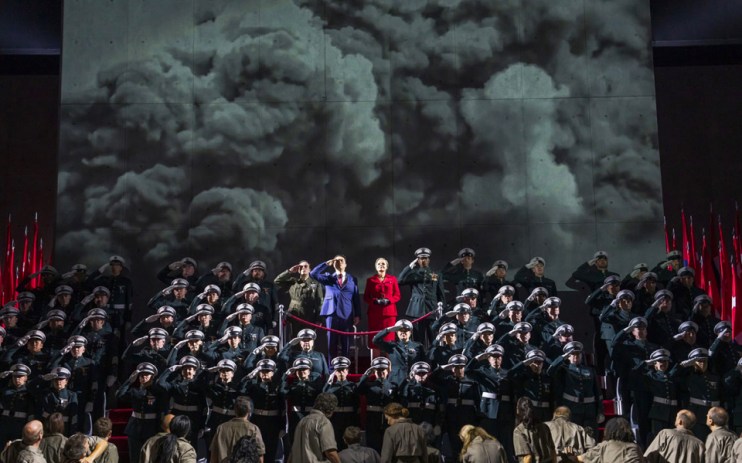Aida at the ROH is a thrilling opera set against a bleak backdrop

Giuseppe Verdi’s Aida is an opera usually characterised by unabashed spectacle. When the original production opened in Cairo in 1871, the stage was adorned with all manner of ancient Egyptian finery.
Many contemporary productions follow this original formula, more or less, but director Robert Carson swerves away from it in this brand-new Royal Opera House production. Instead, Carson draws inspiration from the much bleaker world of modern totalitarianism. It’s about as far away from palm trees and hieroglyphics as you can get.
Given recent debates over casual racism and cultural appropriation in opera, Carson avoiding Aida’s uncomfortable aspects is no accident, and doesn’t detract from the story. Radames as the ‘Egyptian’ general and Aida as the ‘Ethiopian’ princess have a Romeo and Juliet style love for one another that blooms ever more powerfully under the nameless, and therefore, utterly senseless conflict.
Meanwhile, Amneris’s love for Radames grows even more desperate under the harsh light of a jealousy tinged with bigotry. The oppressive regime we’re transported to is devoid of specificity and draws on the imperious imagery that we’ve grown all too familiar with from Putin’s Russia and Trump’s America.
The set, designed by Miriam Buether, is dominated by three heavy concrete walls, making the stage feel like a cross between a brutalist memorial and the national bank of an autocratic state. It’s drab, bleak and slightly uninspired, but undeniably effective when combined with a full chorus with assault weapons casting fearsome shadows on harsh, angular walls.
While a political drama emerges from the intense staging, the heart of this Aida comes from the music and the performances. Elena Stikhina makes for a strong Aida, able to retain resolve even through the most delicate of pianissimo singing.
She is a beautiful match for Francesco Meli as Radames. Meli’s rendition of the famous ‘Celeste Aida’ aria is filled with warmth and performed with the arresting passion of an excellent musician.
Agnieszka Rehlis, however, gives an uneven performance as Amneris, unable to soar above the orchestra in the first half, although her plea for ‘peace’ in Act IV is hauntingly beautiful. Antonio Pappano brings a heated, ferocious energy to his conducting. His drive served the chorus well, whose power, especially during the military parade in act two, is exhilaratingly fierce.
The procession, choreographed by Rebecca Howell, is an unusual mix of capoeira and military drill – but it works. The erratic movements of the dancers are a welcome change to the rigid and controlled actions of the chorus soldiers, whose ‘tos and fros’ quickly become tiresome.
While Carson must be commended for making an extravaganza of an opera deliver against the bleakest set imaginable, the excessive flag waving could leave you cold. Those of us who have had our fill of military processions over the last few weeks should probably visit towards the end of the run.
But no matter how bored you are of seeing someone march up and down, this Aida is undeniably worth a visit. The musical drama alone will have you pinned to your seat.